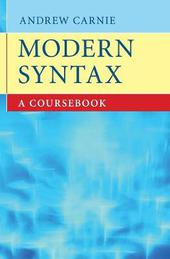
|
Modern Syntax: A Coursebook
Hardback
Main Details
| Title |
Modern Syntax: A Coursebook
|
| Authors and Contributors |
By (author) Andrew Carnie
|
| Physical Properties |
| Format:Hardback | | Pages:370 | | Dimensions(mm): Height 254,Width 180 |
|
| Category/Genre | linguistics
Grammar and syntax |
|---|
| ISBN/Barcode |
9780521863353
|
| Classifications | Dewey:415 |
|---|
| Audience | | Tertiary Education (US: College) | |
|---|
|
Publishing Details |
| Publisher |
Cambridge University Press
|
| Imprint |
Cambridge University Press
|
| Publication Date |
13 January 2011 |
| Publication Country |
United Kingdom
|
Description
This practical coursebook introduces all the basics of modern syntactic analysis in a simple step-by-step fashion. Each unit is constructed so that the reader discovers new ideas, formulates hypotheses and practises fundamentals. The reader is presented with short sections of explanation with examples, followed by practice exercises. Feedback and comment sections follow to enable students to monitor their progress. No previous background in syntax is assumed. Students move through all the key topics in the field including features, rules of combination and displacement, empty categories, and subcategorization. The theoretical perspective in this work is unique, drawing together the best ideas from three major syntactic frameworks (minimalism, HPSG and LFG). Students using this book will learn fundamentals in such a way that they can easily go on to pursue further study in any of these frameworks.
Author Biography
Andrew Carnie is Professor of Linguistics at the University of Arizona, where he teaches syntactic theory and Celtic linguistics. His previous publications include Constituent Structure, Second Edition (2010), Irish Nouns (2008) and Syntax: A Generative Introduction, Second Edition (2006).
Reviews'An ideal point of entry into the complex and challenging science of natural language syntax. Highly recommended.' Cedric Boeckx, ICREA and Universitat Autonoma de Barcelona 'This is a daring introduction into syntax. Rather than telling students what syntactic theory looks like, it makes them do syntax. Rather than presenting them with a standard framework, it provides students with the tools and knowledge to pursue any of the major theories. This is a friendly and experienced guide to the rough terrain and breathtaking vistas of modern syntactic theory.' Ad Neeleman, Professor of Linguistics, University College London
|